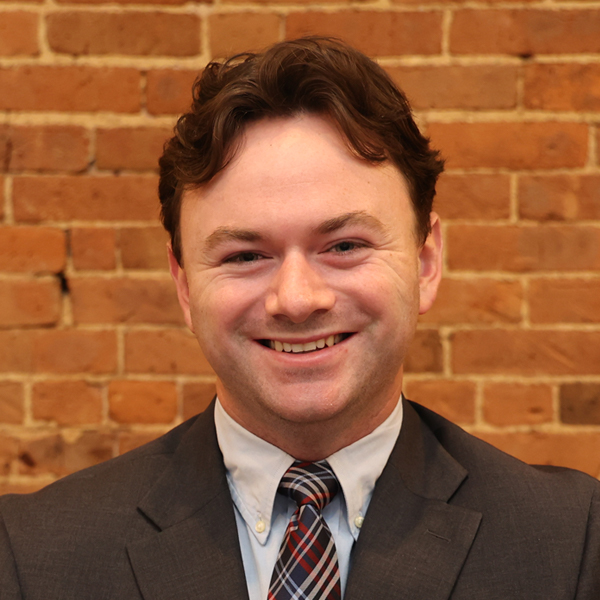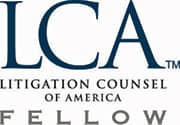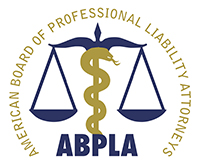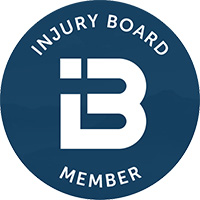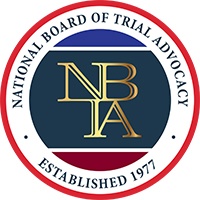Medical Malpractice Attorneys Serving Rhode Island
The Rhode Island medical malpractice lawyers at Mandell, Boisclair & Mandell, Ltd. have successfully helped victims of medical negligence for more than 45 years. Attorney Mark Mandell has won more million-dollar and multi-million dollar verdicts and judgments than any other lawyer in our state’s history. We have been recognized by Best Lawyers and Super Lawyers as the Best Law Firm and Lawyer of the Year in the areas of medical malpractice, personal injury, and more.
If you or a loved one have suffered at the hands of a doctor or other medical professional, contact us today online or at (401) 273-8330 for a FREE initial consultation. We handle cases on a contingency fee basis, which means you don’t owe us anything unless we achieve a favorable outcome in your case.
Medical malpractice cases are very complex, expensive, and time-consuming. You need a law firm with the knowledge, skill, and resources needed to handle these difficult cases. Our seasoned medical malpractice lawyers and medical experts will thoroughly investigate every aspect of your case and fight diligently to achieve justice on your behalf.
What Is Medical Malpractice?
Medical malpractice is a legal cause of action that occurs when medical or health care professionals deviate from standards in their profession and cause harm to a patient due to their negligence.
What Constitutes Medical Negligence in Rhode Island?
Medical Negligence occurs when a medical provider (i.e. a doctor, surgeon, anesthesiologist, nurse or other health care professional) acts or fails to act in a manner that deviates from the accepted standard of care.
To prove medical negligence, your attorney must demonstrate that:
- The medical professional owed you a duty of care
- An error or omission on the part of the medical professional violated the standard of care
- You suffered an injury due to the error or omission
- Your injury or injuries resulted in physical, emotional and/or economic harm
To determine whether you have a valid claim, your attorney will review your medical records thoroughly and work with experts to determine if medical negligence caused your injuries and what damages you may be entitled to recover as a result.
Types Of Cases Our Providence Medical Malpractice Lawyers Handle
Our attorneys have experience successfully handling cases in a range of legal matters involving medical negligence, including:
Anesthesia Errors
Anesthesia is necessary to prevent patients from experiencing pain during a medical procedure. However, administering anesthesia is not without risk. Anesthesia errors can have devastating, sometimes with fatal consequences. When mistakes happen, it is important to determine if a medical practitioner should be held accountable for the error.
Mistakes with anesthesia can happen anytime before, during, or after a procedure or operation.
Preoperative anesthesia errors can include:
- Failure to provide preoperative instructions to the patient (i.e., not instructing a patient to fast for a certain amount of time before the procedure)
- Failure to adequately examine the patient’s medical history for possible complications
- Failure to educate the patient about potential risks involved with the procedure they are about to undergo
Anesthesia errors that can occur during surgery include:
- Failure to properly insert the intubation tube
- Failure to monitor the patient’s vital signs
- Failure to monitor or administer oxygen properly
- Failure to administer the correct type of anesthesia
- Failure to administer the correct amount of anesthesia
- Delayed administration of anesthesia
- Failure to identify or treat complications
- Using faulty or defective equipment
Postoperative anesthesia errors can include:
- Failure to provide postoperative instructions to the patient
- Failure to monitor a patient who is still anesthetized
- Leaving a patient sedated for too long
Birth Injuries and Pregnancy Difficulties
Medical practitioners have a duty to deliver babies safely. When the negligent actions of medical professionals result in birth injuries, they can – and should – be held accountable for their negligence. Medical errors that can cause a birth injury include:
- Failure to respond to signs of fetal distress
- Failure to perform a cesarean section or prompt vaginal delivery for a baby in distress
- Failure to provide appropriate interventions during labor and delivery
- Misuse of a vacuum extractor or forceps during delivery
- Failure to manage prolonged or post-term pregnancy properly
- Failure to provide appropriate prenatal care
- Failure to treat preeclampsia (maternal elevated blood pressure)
- Failure to respond to bleeding appropriately
- Failure to resuscitate a newborn properly
Brain Injuries
Brain injuries are often the result of a traumatic blow to the head in a car accident. Brain injuries can also be caused by medical negligence.
Medical professionals can cause a patient to suffer brain damage for a number of reasons, the most common of which can include:
- Using forceps or a vacuum extractor incorrectly during a child’s birth
- Failure to diagnose or treat a pulmonary embolism properly
- Failure to diagnose or treat an aneurysm or brain bleed in a timely manner
- Failure to make a timely diagnosis of a heart attack or stroke
- Failure to treat excessive bleeding during a procedure, resulting in decreased oxygenation
- Failure to intubate a patient during surgery properly
- Failure to monitor a patient under anesthesia
- Failure to give a patient the correct dose or type of medication
Cardiac Care and Cardiologist Negligence
Receiving proper cardiac care is often a matter of life or death. In the case of a heart attack, every minute that proper diagnosis or treatment is delayed can make a difference in the outcome. When health care providers fail to identify the symptoms of a heart attack, the results can be catastrophic.
Common examples of cardiologist malpractice include:
- Diagnostic errors, such as failure to read EKG results properly
- Inadequate record-keeping
- Improper treatment
- Surgical errors
Emergency Room Errors
Emergency room errors can cause patients in need of immediate care to suffer even greater consequences. In the rush to save lives, miscommunication and errors occur that can create or worsen dangerous medical problems. In the work environment of an emergency room, even seemingly small errors can cause catastrophic consequences.
Some of the most common causes of emergency room errors include:
- Failure to provide timely care to the patient after arriving at the emergency room
- Failure by Rhode Island Emergency rescue team to respond in a timely manner
- Omissions of critical medical information
- Blood transfusion errors
- Diagnosis errors
- Medication errors
- Failure to perform correct tests
- Unsanitary equipment
- Equipment failure
- Delayed test results
- Testing errors
- Untrained or inexperienced staff
- Inadequate follow-up instructions to the patient
- Inappropriate discharge from the emergency room
Failure to Diagnose and Delayed Diagnosis
Failure to diagnose occurs when a physician fails to diagnose a patient’s condition. A negligent failure to diagnose can occur for a variety of reasons, such as:
- Failure to conduct appropriate diagnostic testing
- Failure to identify the symptoms of an illness
- Correctly identifying an illness or condition, but failing to diagnose the correct stage of the ailment (such as a misdiagnosis of cancer being Stage One, or the beginning stage, when it is actually Stage Four, a final stage)
Misdiagnosis
Much like a failure to diagnose, medical misdiagnosis occurs when a doctor fails to diagnose a patient’s condition properly. However, a misdiagnosis is not just the failure of a doctor to identify an illness. Misdiagnoses can result from:
- Failure to test appropriately based on symptoms
- Failure to obtain relevant and accurate information from the patient, such as medical history or presentation of symptoms
- Misinterpreted lab results
- Failure to refer a patient to a specialist
- Failure to anticipate complications that aggravate a condition
- Failure to screen for a specific medical condition that may impact the treatment or diagnosis
- Misinterpretation of diagnostic tests
Medication Errors, Prescription Errors, and Pharmacy Errors
Medication errors, prescription errors, and pharmacy errors occur when an incorrect drug or dose is prescribed to a patient by a physician, a wrong medication is given to a patient by a nurse in a hospital setting, or a prescription is incorrectly filled for a patient by a pharmacist. These types of mistakes can happen in a number of ways, such as:
- Failure to prescribe or give the correct medication
- Failure to prescribe or give the correct dosage
- Failure to give the prescribed medication to the correct recipient
- Prescribing unnecessary medication due to a misdiagnosis
- Incorrect dosing caused by medical equipment failure
- Failure to warn about harmful side effects
- Failure to identify harmful drug interactions
- Failure to identify allergic reactions
- Dispensing expired medication
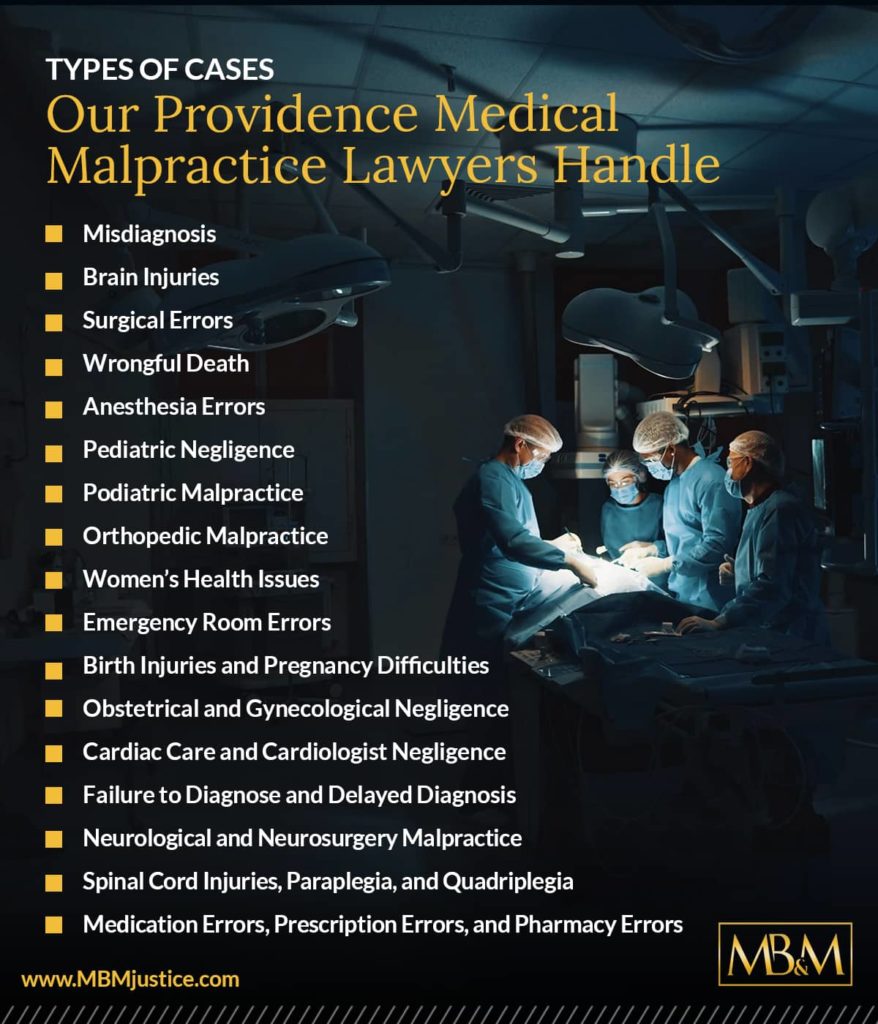
Neurological and Neurosurgery Malpractice
Neurology and neurosurgery involve the diagnosis and treatment of injuries and conditions concerning the nerves and nervous system. This can include issues regarding muscles, peripheral nerves, the spinal cord, the brain, and vascular systems that relate to those structures.
Neurological and neurosurgical malpractice can include:
- Failure to repair nerve injuries in a timely manner
- Failure to monitor nerves properly during surgical procedures
- Failure to diagnose and treat a patient with increasing intracranial pressure
- Delayed evaluations of patients with suspected or known neurological injuries
- Delayed neurological evaluations following an acute head, neck, or spinal injury
Obstetrical and Gynecological Negligence
OB/GYN malpractice involves the failure of an obstetrician or members of their staff to perform up to the standards accepted within the medical community. When medical professionals are negligent during the diagnosis, treatment, or follow-up care of a patient, both the mother and child can be permanently harmed.
Examples of OBGYN negligence can include:
- Failure to conduct prenatal tests
- Failure to conduct labor correctly
- Failure to diagnose cervical cancer in time for adequate treatment
- Improper use of forceps
- Failure to identify complications involving the umbilical cord
- Failure to determine prenatal conditions such as ectopic or tubal pregnancy
- Mistakes in testing for congenital disorders
- Unnecessary surgery
- Surgical errors during a hysterectomy or C-section delivery
- Failure to diagnose or treat preeclampsia, or pregnancy-induced hypertension (PIH)
- Failure to properly treat post-delivery bleeding
Orthopedic Malpractice
Orthopedic medicine deals with the functioning and treatment of bones, muscles, ligaments, tendons, and joints. Injuries to the neck, shoulder, back, wrists, knees, ankles, and feet can be created or worsened by negligent care.
Some examples of orthopedic malpractice include:
- Failure to properly set broken bones or to obtain proper alignment of a fracture
- Surgical errors causing nerve damage
- Surgery at the wrong level of the spine
- Errors during repairs of the anterior cruciate ligament (ACL)
- Errors during hip or knee replacement surgery
- Surgical errors in foot surgery
Pediatric Negligence
Pediatric malpractice involves errors made in the field of pediatric medicine, which focuses on the care of children and infants. Pediatric treatment is a very specialized and important area, especially when a young life is jeopardized by negligence. In these difficult cases, a pediatrician can harm a child through negligence acts such as:
- Failure to make an accurate diagnosis
- Failure to adequately test
- Failure to properly treat infants and children
- Failure to diagnose or delayed diagnosis
- Medication error
- Mismanaged infection
Podiatric Malpractice
Podiatric medicine deals with the treatment of feet and ankles. Podiatric malpractice can include negligent acts such as:
- Delaying a necessary procedure
- Failure to perform surgery properly
- Failure to refer a patient to a specialist
- Misdiagnosis or delayed diagnosis
- Anesthesia errors
Spinal Cord Injuries, Paraplegia, and Quadriplegia
Surgeons who perform procedures on the spine have a duty to perform surgeries with the same standard of care that any other doctor would under similar circumstances. If the surgeon causes harm to a patient by deviating from the standard of care, the patient may pursue compensation for his or her subsequent losses, which could involve paraplegia and quadriplegia.
Medical negligence may be involved in a spinal cord injury for a number of reasons, including:
- Anesthetic errors during surgery
- Delaying a necessary surgical procedure
- Surgical errors
- Failure to detect a spinal tumor
- Failure to diagnose a medical condition
Surgical Errors
Surgical errors refer to mistakes made by surgeons or hospital staff members before, during, and after a surgical procedure. Serious complications can result from these mistakes, causing severe injury or even death to patients.
Types of surgical errors include:
- Wrong-patient surgery (the procedure for one patient is performed on another patient)
- Wrong-site surgery (surgery performed on the wrong limb, organ, or other part of the body)
- Wrong-procedure surgery (an incorrect surgery performed on the correct body part)
- Improperly performed surgery
- Failure to monitor patients for postoperative complications
- Failure to provide the correct anesthesia
- Failure to review all charts and instructions properly before surgery
- Failure to obtain informed consent or explain the risks of surgery
- Failure to administer the correct blood type
- Failure to perform a medically necessary surgery in time
- Surgical instruments left in the body, such as a scalpel, gauze, sponge, or other foreign object
Women’s Health Issues
Most women begin to see gynecologists in their late teens, early 20s, or sooner if they are sexually active or have other specific issues. Medical malpractice related to women’s health can occur at any point in a woman’s life and extend well into adulthood and after menopause.
Some of the most frequent instances of gynecological malpractice include:
- Sterilization, hemorrhage, infection, or injury because of a surgical error
- Medication errors
- Adverse reactions or side effects to hormonal treatments or medications
- Surgery or interpretation errors
- Failure to order or properly perform a pap smear, leading to a failure to detect, diagnose, or treat uterine or cervical cancer in a timely manner
- Failure to detect, diagnose or treat breast cancer
- Failure to properly interpret and follow up on a mammogram with a biopsy or ultrasound
Wrongful Death
If you lost a loved one as a result of medical negligence, you and your family may be entitled to compensation through a medical malpractice wrongful death claim. Recoverable damages may include:
- Conscious pain and suffering your loved one endured
- Medical expenses prior to death
- Funeral and burial or cremation costs
- Loss of earning capacity
- Loss of household services
- Loss of consortium and society
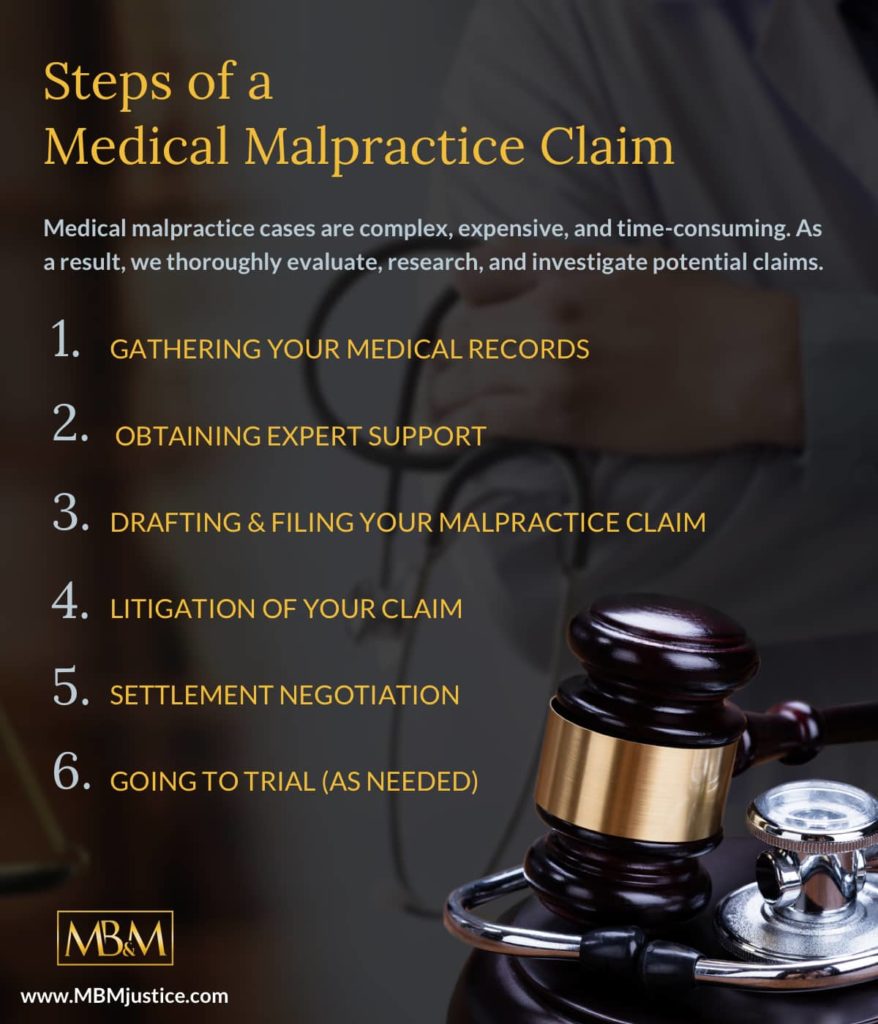
What Damages Can I Recover in a Medical Malpractice Claim?
The compensation you receive in your case will depend on the losses you suffered as a result of the medical negligence. After a thorough investigation, your attorney will advise you on what damages may be recoverable.
Potential damages in a medical malpractice claim include:
- Past medical expenses related to the negligence
- The cost of ongoing and future medical treatment, including medications, therapies, surgeries, and other necessary treatment
- The cost of attendant care
- Past lost wages
- Future loss of earning capacity
- Assistive devices, modifications to your home and vehicle, home-based services, and other out-of-pocket expenses
- Pain and suffering
- Emotional anguish
- Disability
- Scarring and disfigurement
- Loss of enjoyment of life
- Loss of consortium and society
If medical negligence caused the death of your loved one, you and your family may be entitled to compensation through a medical malpractice wrongful death claim.
How Does A Providence Medical Malpractice Lawsuit Work?
The first step to putting together a malpractice claim will be a free consultation where we’ll go over the details of your specific situation and give you an honest case evaluation. If we think you have a valid claim, we’ll discuss how we can help and what our approach would be. We’ll do our best to answer any questions you may have during the initial consultation and start putting together a plan to move forward.
Gathering Your Medical Records
Next, we’ll need to start gathering your medical records. Our team will instruct you on exactly what needs to be done to make a formal request for all of the records that will be needed to move forward with your claim. The goal will be to put together as many details as possible about your medical consultations, treatments, tests and results, past and present health status, etc.
Expert Support
Once we’ve gathered and reviewed your medical records, if we feel we have enough to move forward, the next step will be to obtain expert support for your claims. In order to file a medical malpractice claim in Rhode Island and Massachusetts, you need a medical expert to testify that the conduct of the medical provider at issue was below the standard of care and caused your injuries.
Draft and File A Medical Malpractice Complaint
Once we’ve gathered and reviewed your medical records and obtained expert support for your claims, the next step will be to draft and file a malpractice lawsuit, or complaint, on your behalf. This is where we will describe what wrong has been done to you, the consequences you’ve suffered, and the compensation you should receive for your losses and pain and suffering.
Litigation of Your Claim
Next comes the actual litigation of your claim. At this point, we will seek out documents and statements from those who are at fault as well as others involved with your case. We will typically take depositions (oral statements) from involved parties and witnesses. This may also involve filing motions to force cooperation if any of the parties deny our requests.
The other side will be going through the same process and may make requests to you. They may, for example, ask that you undergo a medical exam to determine your current state of health.
Settlement Negotiation
Often times the parties will try to negotiate a settlement before your case comes to trial. A settlement will often be the fastest way for you to get the compensation you deserve and move on with your life.
We will handle the negotiations with the defendant’s attorney(s) and report to you. We’ll give you our professional opinion on any offers made, but the final decision to accept or decline will be yours.
Going to Trial
If a settlement agreement can’t be reached, we will take your medical malpractice case to trial. A trial will involve the presentation of evidence from both plaintiff and defendant as well as testimony from expert witnesses on both sides who will attempt to explain the medical aspects of the case to the jury.
If your case goes to trial, our team will thoroughly prepare you as well as any witnesses before the trial actually happens.
The jury’s decision will be announced in court. If the jury rules in your favor, the amount you will be awarded will also be announced.
What Is the Statute of Limitations for Medical Malpractice in Rhode Island?
In most cases, Rhode Island medical malpractice must be filed within three years of the date when the injury occurred. However, there are circumstances in which the deadline to file could vary from this rule. For example, if the injury was not reasonably discoverable at the time it occurred, legal action must be commenced within three years of the time that the act of malpractice is, or should have been, reasonably discovered.
The statute of limitations could be extended if the patient was a minor at the time of the negligent act. In that situation, the statute of limitations would begin to run on that person’s 18th birthday.
If you miss the deadline to file a personal injury claim within the time allowed under the statute of limitations, you will most likely lose your chance to recover the compensation you deserve. It is in your best interest to speak with a Providence medical malpractice lawyer as soon as possible.
Speak With A Providence Medical Malpractice Lawyer for Free
Medical malpractice claims are different from the average personal injury claim. They require the help of a law firm that is not only experienced but understands the specifics of both medicine and the law. Success depends on more than just proving that you’ve been hurt. It must be proven that a medical professional was negligent when caring for you or a loved one and that their negligence caused harm.
The law office of Mandell, Boisclair & Mandell, Ltd. has the knowledge and experience you need on your side. Attorney Mark Mandell has won more million-dollar jury verdicts and court judgments, as well as verdicts and judgments over $10,000,000 than any other lawyer in Rhode Island’s history.
If you have been the victim of medical malpractice, you can contact us online anytime or call (401) 273-8330 to schedule an appointment. Your initial consultation is FREE and confidential. We’ll be happy to go over your case and discuss what we can do to help you with your malpractice claim. We handle both Rhode Island Medical Negligence and Massachusetts Medical Negligence claims.
Medical malpractice claims are complex, and require the knowledge and insight of an attorney with significant experience in these difficult claims. If you believe medical negligence may have caused you harm, it is in your best interest to discuss your situation with a medical malpractice attorney as soon as possible. When representing you, your lawyer will need to prove the following:
- A doctor-patient relationship existed
- The doctor violated the owed duty of care
- Your injury was caused by the doctor’s actions or omissions
- You suffered damages as a result of the medical malpractice
A medical professional does not have to be a doctor or surgeon to be held liable for medical malpractice. Claims can be brought against other healthcare providers (such as nurses, chiropractors, dentists, and podiatrists) as well as hospitals and other healthcare facilities for the harm they cause patients.
A Providence medical malpractice attorney will examine the facts in your case to determine which party or parties may be held liable for your losses. Mandell, Boisclair & Mandell, Ltd. has a proven record of success in these difficult cases. We understand both the medicine and the law involved in these claims.
Unlike many states, Rhode Island does not limit (or “cap”) damages in cases of medical malpractice. Once a jury has found a defendant liable for medical negligence, there is no statutory limit on the amount of money that a successful plaintiff can receive.
Diagnostic errors are a leading contributor to medical malpractice claims, accounting for 33% of claims from 2013 to 2017.
Late or incorrect diagnoses can cause patients to miss timely treatment or receive unnecessary treatments. A misdiagnosis can occur when a doctor fails to:
- Identify clinical signs and symptoms
- Order medical testing or seek additional information
- Refer a patient to a specialist
Other types of errors that can affect the diagnosis of a health condition include:
- Errors when conducting a test or evaluating data
- Lost test results
- Mislabeled test or lab results
The failure to receive an accurate and timely diagnosis can have life or death consequences. A medical professional who is reckless with this process should be held accountable.
In most cases, there are no guarantees of medical results. Just because someone is not satisfied with the unsuccessful or unexpected results of a surgery or procedure, it does not necessarily indicate that negligence occurred.
To succeed in a medical malpractice case, a plaintiff must prove that an injury or damages resulted from the medical provider’s deviation from the standard of care applicable to the procedure.







